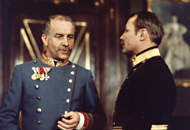Central to both Hofmannsthal’s “tale” and “The Man Without Qualities” is a concern for what happens to the individual when larger, wider spreading societal problems or trends arise. The advent of industrialism was followed by the rise of an affluent middle class that typified much of Viennese culture at the turn of the century. Both Ulrich and the Merchants sons portray characters alienated by the rise of this culture, yet in very different ways. The Merchant’s son embraces the aestheticism of the time to such an extent that value he places on the upkeep of his material, aesthetical, or ornamental surroundings keeps him from developing as a social individual. Ulrich, on the other hand, experiences alienation because he is skeptical of his generation and their culture. While the Ulrich’s outcome remains undetermined we see the Merchant son grow self-conscious and aware of his alienated lot, fearing the judgment of his paid servants. Yet ultimately he is unable to better himself and he dies alone.
skip to main |
skip to sidebar

Franz Ferdinand and Alfred Redl
Blog journal coffeehouse & other resources for the UW Germanics Winter Quarter '08 Vienna 1900 course. Professor: Heidi Tilghman, TA: Elisabeth Cnobloch
Question for Week of March 10, 2008
Please view the photo of Colonel Redl and Franz Ferdinand as portrayed in Istvan Szabo's film "Oberst Redl" (below). As we discussed briefly in class, Franz Ferdinand is portrayed as the polar opposite of Franz Josef, the Emperor whom Redl loved. Yet in order to serve the Empire which he loves, he has to do Franz Ferdinand's bidding. This political bind becomes a moral bind for Redl that derives its power from his own identity crisis as well as the identity crisis of Franz Ferdinand (who is not emperor but who acts like it) and indeed the entire Empire. Unravel this mess! Who can be called "authentic" in this film?
Colonel Redl

Franz Ferdinand and Alfred Redl
Question for the week of February 22
Dream Story on the Couch
The connection between Schnitzler’s Dream Story and Freud’s psychoanalysis is obvious as well as the connections are numerous. Give an example and analyze it.
The connection between Schnitzler’s Dream Story and Freud’s psychoanalysis is obvious as well as the connections are numerous. Give an example and analyze it.
Question for the week of February 15, 2008
Explore Schnitzler’s “Reigen” in regards to death, sexuality, and power (structures).
Question for February 8, 2008
Think about the role music plays in The Man without Qualities. What´s going on when Walter and Clarisse sit down at the piano? Explore this question further and connect it with our discussions and presentations in class.
Question for February 1, 2008
What is Hofmannsthal's Lord Chandos upset about? Is this a psychological, aesthetic or ethical crisis? What do you think that Ulrich would have to say to Lord Chandos?
Question for week of January 28
Please follow up on our discussion in class today (Friday, 1-25) Hofmannsthal's "Tale" can be read, of course, for the plot-line, but it gains depth if read also by paying special attention to images or leitmotifs: things like eyes and lips and teeth; colors; qualities of light, etc. Re-read what Janik and Toulmin had to say about Hofmannsthal; look at my study questions and re-read the story. What questions is Hofmannsthal posing in his "Tale"? What sorts of issues are troubling him; what's he worried about? How does he explore these issues and questions? Do any of his questions resonate with issues posed thus far in The Man without Qualities?
Question for the Week of January 21, 2008
Why were people like Kraus and Hofmannsthal so worried about language? What moral dilemmas did they see in language usage? How could a poem lie? Why was it such a big deal?
Question for week of January 14, 2008
Who is Ulrich? What do you think it means to be a man without qualities? How do you make sense of him?
Remember to offer your blog on this question--or on some other topic stemming from the reading and class discussion--by Wednesday midnight. Then please comment on one of the blogs by Friday midnight.
Remember to offer your blog on this question--or on some other topic stemming from the reading and class discussion--by Wednesday midnight. Then please comment on one of the blogs by Friday midnight.


No comments:
Post a Comment